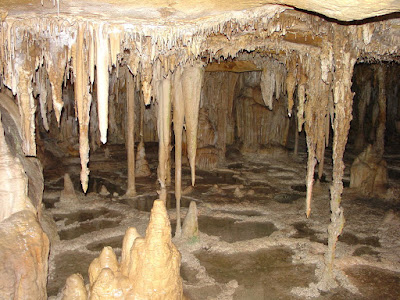Being interested in both POW history and caves you'd think the possibility of an etymological connection between "Stalag" and "stalagmite" would have occurred to me long ago. But it was only recently that the resemblance caught my eye.
But it seems to be an unusual case of linguistic coincidence.
"Stalag" of course is of German origin. It is a contraction of the word "Stammlager". This in turn is, in most typical Teutonic fashion, a word welded together from two smaller bits. "Stamm", which has several meanings including permanent, and "Lager" meaning a storage place, or in another sense, a camp. So "permanent camp" might be about right. In the WWII German system there were also temporary camps called "Dulag". This is a much shortened version of "Durchgangslager". Durchgang means approximately "just passing through".
We are of course more familiar with Lager in the sense of storage, lager beer requiring a long ageing period, often in caves.
But despite the frequent appearance of German words in scientific realms, stalagmite and stalactite are not directly related to the above.* They are said to derive from Modern Latin circa 1650 with origins in the Greek "stalagmos, a drop, drip or that which drops".
Odd that both etymological paths end up in enclosed places where time is measured in a tedious, slow, drip...drip...drip...
------------
* OK, I did find one source that said "stalagmos" came from an earlier Greek word, "stalassien" meaning to trickle. And that this word meandered around the ancient world long enough to bring forth the German root word "stallen". This word with a general sense of things staying in one place (see stalls in a barn) may have wandered in a side door.

No comments:
Post a Comment